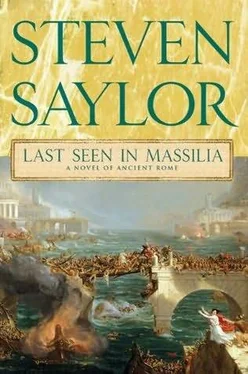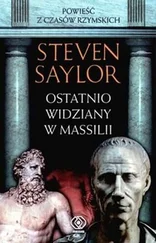Steven Saylor - Last seen in Massilia
Здесь есть возможность читать онлайн «Steven Saylor - Last seen in Massilia» весь текст электронной книги совершенно бесплатно (целиком полную версию без сокращений). В некоторых случаях можно слушать аудио, скачать через торрент в формате fb2 и присутствует краткое содержание. Жанр: Исторический детектив, на английском языке. Описание произведения, (предисловие) а так же отзывы посетителей доступны на портале библиотеки ЛибКат.
- Название:Last seen in Massilia
- Автор:
- Жанр:
- Год:неизвестен
- ISBN:нет данных
- Рейтинг книги:3 / 5. Голосов: 1
-
Избранное:Добавить в избранное
- Отзывы:
-
Ваша оценка:
- 60
- 1
- 2
- 3
- 4
- 5
Last seen in Massilia: краткое содержание, описание и аннотация
Предлагаем к чтению аннотацию, описание, краткое содержание или предисловие (зависит от того, что написал сам автор книги «Last seen in Massilia»). Если вы не нашли необходимую информацию о книге — напишите в комментариях, мы постараемся отыскать её.
Last seen in Massilia — читать онлайн бесплатно полную книгу (весь текст) целиком
Ниже представлен текст книги, разбитый по страницам. Система сохранения места последней прочитанной страницы, позволяет с удобством читать онлайн бесплатно книгу «Last seen in Massilia», без необходимости каждый раз заново искать на чём Вы остановились. Поставьте закладку, и сможете в любой момент перейти на страницу, на которой закончили чтение.
Интервал:
Закладка:
"And what is your place in this scheme of things?" I asked quietly.
"A man like me has no place at all," he said dully. "Oh, now I do. I'm the scapegoat." He smiled, but his voice was bitter. Hieronymus called for more wine. More Falernian was brought. Such largesse in a city under siege seemed nothing less than profligate.
"Let me explain," he said. "My father was one of the Timouchoi-the first of my family to rise so high. He was made a member just after my birth. A few years later, he was elevated to the Council of Fifteen, one of the youngest men ever elected to that body. He must have been a man of great ambition to rise so high, so fast, leapfrogging past men from richer, older families than ours. As you might imagine, there were those among the Timouchoi who were jealous of him, who believed that he had stolen honors properly due to them.
"I was his only child. He raised me in a house not unlike this one, up here on the crest of the ridge where the old money lives. The view from our rooftop was even more spectacular than this; or perhaps my nostalgia embellishes it. We could see all Massilia below, the harbor filled with ships, the blue sea stretching on and on to the horizon. `All this will be yours,' he told me once. I must have been quite small because I remember that he picked me up, put me on his shoulders, and turned slowly about. `All this will be yours…' "
"Where did his money come from?" I asked. "From the trade."
"The trade?"
"All wealth in Massilia comes from the slave and wine trade. The Gauls ship slaves down the Rhodanus River for sale to Italy; the Italians ship wine from Ostia and Neapolis to sell to the Gauls. Slaves for wine, wine for slaves, with Massilia in the middle, providing ships and taking her cut. That's the foundation of all wealth in Massilia. My great-grandfather began our fortune. My grandfather increased it. My father increased it more. He owned many ships.
"Then the bad times came. I was still quite young-too young to know the details of my father's business. He told my mother that he had been betrayed by others, cheated by men among the Timouchoi whom he had considered his friends. He had to sell his ships, one by one, to pay his creditors. It wasn't enough. Then our warehouse near the harbor burned to the ground. My father's enemies accused him of setting the fire himself to destroy records and avoid debts. My father denied it." Hieronymus paused for a long moment. "If only I had been older, able to understand all that was happening. I'll never know the truth-whether my father was responsible for his own ruin, or whether others destroyed him. It's a painful thing, never to know the whole truth."
"What became of him?"
"He was suspended from the Council of Fifteen. The Timouchoi began proceedings to expel him."
"Were there criminal charges?"
"No! It was worse than that. He had lost all his money, don't you see? In Massilia there's no greater scandal. What matters to a Roman most?"
"His dignity, I suppose."
"Then imagine a Roman stripped completely of his dignity, and you may understand. Without wealth, a man in Massilia is nothing. To have possessed wealth and to have lost it-such a thing could happen only to the worst of men, men so vile they've offended the gods. A man like that must be shunned, despised, spat upon."
"What became of him?"
"We have a law in Massilia. I imagine it was devised for just such men as my father. Suicide is forbidden, with penalties exacted upon the suicide's family-unless a man applies to the Timouchoi for permission."
"Permission to take one's own life?"
"Yes. My father applied. The Timouchoi took up the matter as they might have taken up a trade bill. It saved them the embarrassment of expelling him, you see. The vote was unanimous. They were even so kind as to supply him with a dose of hemlock. But he didn't take it."
"No?"
"He chose the harder way. Down there, where the land meets the sea, do you see that finger of rock that juts up through the city wall, so massive they had to build the wall around it?"
"Yes." The rock was naked of vegetation, its summit stark white against the blue sea.
"Its official name is the Sacrifice Rock. Sometimes people call it Suicide Rock, or Scapegoat Rock. If you're agile enough, you can climb onto it from the battlements of the city wall. If you're fit enough, you can climb from the base to the top without using the walls at all. It's not as steep as it looks, and there are plenty of footholds. But once you reach the top, it's a frightening place. The view over the edge is dizzying-a long, sheer drop to the sea. When the wind is high at your back, it's all a man can do to keep from being blown off."
"Your father jumped?"
"I remember that morning vividly. It was the day after the Timouchoi approved his request. He dressed in black and left the house without a word. My mother wept and tore her hair, but she didn't try to follow him. I knew where he was headed. I went up on the roof and watched. I saw when he reached the foot of the rock. A crowd had gathered to watch him climb. He looked so small from our roof-a tiny black figure scaling a white finger of rock. When he reached the top, he didn't hesitate, not even for an instant. He stepped over the edge and vanished. One moment there, the next-gone. My mother was watching from a window below me. She let out a scream the moment he vanished."
"How terrible," I said. From old habit, I sifted the unresolved details of his story. "What became of the hemlock?" As soon as I asked, I knew the answer.
"Creditors came to drive us out of the house the next day. My mother could never have borne that. They found her in her bed, as peaceful as if she slept. She broke the law by drinking the hemlock provided for my father; broke the law as well by mixing it with wine, because wine is strictly forbidden to women in Massilia. But no one sought to prosecute her. There was nothing left to confiscate, and no one left to punish but me. I suppose they thought I had already been punished enough for the sins of my parents." He took a deep breath. "I resent her, sometimes, for not staying with me. I resent him, as well. But I can't blame them. Their lives were over."
"What became of you?"
"For a while I was grudgingly passed from one relative to another. But they all considered me to be cursed. They didn't want me in their homes for fear that the curse would rub off. At the first sign of trouble-a fire in the kitchen, a sick child, a slump in the family business-I was tossed out. At last I ran out of relatives. I looked for work. My father had given me good tutors. I knew philosophy, mathematics, Latin. I probably knew more about the trade than I realized, having picked it up from my father. But no one among the Timouchoi would hire me. You might think one of these exiled Romans who keep popping up in Massilia would have found me useful, but not one of them would touch me for fear of offending the Timouchoi.
"Now and again I found work as a common laborer. It's not easy for a free man to make a living by manual labor-too many slaves about who can do the same work for no wages. I can't say that I ever succeeded at anything except staying alive. Some years I barely managed that. I've worn other men's cast-off rags, eaten other men's garbage. I've swallowed my shame and begged for alms. For long periods I've had no roof over my head. Sun and wind turned my skin to leather. Just as well; a hard hide served me well when fellows like that old coot Calamitos took a cane to me, calling me a vagrant, a good-for-nothing, a parasite, the son of a cursed father and an impious mother."
"Calamitos-is he one of the Timouchoi?"
"Artemis, no! None of that gang of old fools is rich. They're contemporaries of my father who never amounted to much, When I was a boy they were all afire with ambition and wracked by their jealousy, Calamitos especially, of my father and his success. After my father died, it gave them great pleasure to gloat over my squalor and to vent their cruelty on me. Nothing comforts the wretched like having someone even more wretched to despise."
Читать дальшеИнтервал:
Закладка:
Похожие книги на «Last seen in Massilia»
Представляем Вашему вниманию похожие книги на «Last seen in Massilia» списком для выбора. Мы отобрали схожую по названию и смыслу литературу в надежде предоставить читателям больше вариантов отыскать новые, интересные, ещё непрочитанные произведения.
Обсуждение, отзывы о книге «Last seen in Massilia» и просто собственные мнения читателей. Оставьте ваши комментарии, напишите, что Вы думаете о произведении, его смысле или главных героях. Укажите что конкретно понравилось, а что нет, и почему Вы так считаете.










